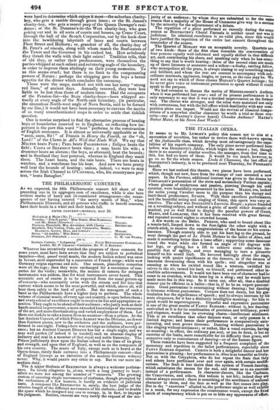THE PHILHARMONIC CONCERTS.
As we expected, the fifth Philharmonic concert fell short of the preceding one in its aggregate sum of excellence, while it also bore evident marks of hasty and ill-considered arrangementâthe conse- quence of our having entered " the merry month of May," when Philharmonic Directors, and all persons who traffic in benefit concerts, have their heads in a whirl and their hands full.
FIFTH CONCERTâMONDAY, MAY 22.
ACT I.
Siufonia.in A Major (No.7) BEETHOVEN. Terzetto, Priadi partir," Miss Brace, Miss MansLui.z,
and Mr. HOBBS (Idomeneo) MOZANT. Fantasia, Pianoforte, Mrs. ANDERSON, with Chorus BEETHOVEN. Quartetto, Two Violins, Viola, and Violoncello, Messrs BLAGROVE, HATTIE. HILL, and LINDLEY MOZART.
Scene, â˘â˘ Ah perfido," Miss Bract( BEETHOVEN.
Overture, Der Freischutz C. M. VON WEBER,
ACT II.
Fcitx MENDELSSOHN B,LETHOLDY.
Sinfonia Cantata, " Lobgesang "
Leader. Mr. F. CRAMERâConductor, Mr. W. S. BENNETT.
Whoever has attentively watched the progress of these concerts for some years, must have been aware that they are subject to periodical impulsesâthat, quoad vocal music, the modern Italian school was once in favour, until superseded by a succession of French songs ; while now Germany reigns supreme and sole. One season, pianoforte concertos were all the rage; then they were exchanged for a succession of con- certos for the violin; meanwhile, the musica di camera for stringed instruments was seldom, that for wind instruments never heard. This eccentric sort of course is to be expected from the usual getters-up of concertsâwho necessarily swim with the stream and fall into that current which seems to be the most powerful, and which, above all, will bear them safely to the land of profit. But the managers of such a band as the Philharmonic have a higher duty to perform. The whole volume of classical music, of every age and country, is open before them ; and every school of excellence ought to receive its due and appropriate at- tention. They ought to be ahead of their audience ; who justly seek at their hands musical improvement, a more extended knowledge of the resources of the art, and more discriminating and varied employment of them. Let them not disdain to take a lesson from an amateurâfrom a prince. At the last Ancient Concert, of which Prince ALBERT was the Director, no fewer than fourteen pieces, new to the orchestra and the audience, were per- formed in one night. Perhaps here was too large an infusion of novelty at once; but an Ancient Concert Director has but a single night, and we may well pardon (if indeed it be needed) such an unusual display of industry and zeal in a member of that royal and noble fraternity. The Prince judiciously drew upon the Italian school in the time of its glory and strength, and upon that of England, as well as on the composers of his own country. The music of Italy, except such as is heard at the Opera-house, rarely finds entrance into a Philharmonic concertâthat of England (except as an imitation of the modern German writers) never. Why, it would puzzle any critic to say. But to our more im- mediate duty. The A major Sinfonia of BEETHOVEN is always a welcome perform- ance. Its lovely allegretto is, alone, worth a long journey to hear; albeit we were not among the number of " encorers." The growing custom of encoring single movements of sinfonias, though prompted by the enthusiasm of a few hearers, is hardly an evidence of judicious taste. A composer like BEETHOVEN is, surely, the best judge of the relative length of the different movements of his sinfonia ; and to double the space which he designed any one to occupy, is, in fact, to impugn his judgment. Besides, encores are very rarely the request of the ma-
jority of an audience; by whom they are submitted to for the same reason that a majority of the House of Commons give way to a motion by the minority for the adjournment of a debate.
The repetition of a piece performed so recently during the same season as BEETHOVEN'S Choral Fantasia is neither usual nor was it judicious. Its admitted excellence is no valid plea, since this would have justified the repetition of the entire last concert throughout the remainder of the season.
The Quartet of MOZART was an acceptable novelty. Quartets are of two kinds: those of the first class resemble the conversation of four persons equally well-informed and equally skilled in that difficult art, each contributing his share, and speaking only when he has some- thing to say that is worth hearing : those of the second class are made up of three listeners or assenters and a talkerâa flashy, rattling fellow, who monopolizes all the prate, is always aiming to say something smart and brilliant, and whom the rest are content to accompany with sub- ordinate murmurs, applauses, laughs, or yawns, as the case may be. We need not say to which of these classes MOZART'S Quartet belongs ; for he never gave voice or instrument permission to speak without it could speak to the purpose.
We had occasion to discuss the merits of MENDELSSOHN'S Anthem when it was performed last year ; and of its present performance it is only necessary to say that it was a decided improvement on the former one. The chorus was stronger, and the solos were sustained not only with correctness, but with the fall effect which familiarity with any com- position alone can impart. Would not the revival of classical compo- sitions of a somewhat similar character be worth a trial at these con- certsâone of HANDEL'S (never heard) Chandos Anthems? HAYDN'S Stabat Mater, or his Seven Last Words?


























 Previous page
Previous page